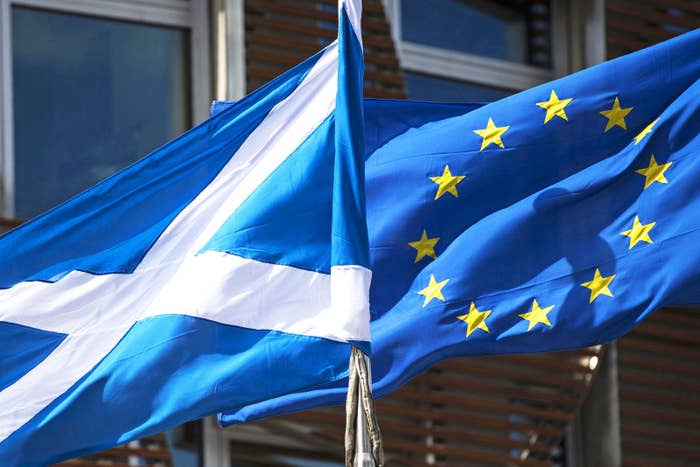
Support for independence is at its highest ever level, according to new research, but voters in Scotland are also becoming increasingly Eurosceptic.
The Scottish Social Attitudes Survey, which has been released every year since the Scottish parliament was established in 1999, shows that support for independence lies at 46% – exactly double where it lay in 2012.
Support for independence is strongest among young people, with 72% of Scottish voters aged between 16-24 now backing independence, according to the research by the Scottish Centre of Social Research.
The result will come as a boost to Nicola Sturgeon two days after she announced her plans for another referendum on independence, blaming Theresa May's failure to compromise with the Scottish government over Brexit.
However, the results, based on interviews with over 1,200 people, also reveal that Euroscepticism is at its highest ever level in Scotland, which will cast doubt on whether another independence referendum based around Europe is the right course of action for the SNP.
In the results, gathered in the months after the Brexit vote, 2 in 3 Scottish voters either wanted to leave the EU (25%) or for the EU's powers to be reduced (42%). Only 21% of respondents said they want arrangements with the EU to stay as they currently are.
That means 67% of Scottish voters could be currently be considered as Eurosceptic, which is a large increase on the 53% of Eurosceptic Scots in 2014's survey, and the 20% of the same in 1999.
Scotland's leading political scientist, Professor John Curtice, said the results showed that Scotland's nationalist movement has "never been stronger electorally", and the EU referendum result was the "perfect illustration" of their argument that Scotland's will always risks being overruled by England.

“However, the commitment to the EU of many of those who voted to Remain does not appear to be strong enough that they are likely to be persuaded by the outcome of the EU referendum to change their preference for staying in the UK," said the professor.
"Meanwhile, there is a risk that linking independence closely to the idea of staying in the EU could alienate some of those who currently back leaving the UK."
Curtice added: "Nicola Sturgeon might have been wiser to have stayed her hand, for on current trends there is a real possibility that demographic change will help produce a majority for independence in the not too distant future anyway.”
Commenting on the report, senior SNP MSP Bruce Crawford said the rise in support for independence came as "no surprise" as, he claims, the promises that were made to Scots after the 2014 referendum have been "systematically unpicked by the UK Tory government".
“While there is much work to do in setting out the challenges and opportunities of independence, how we build a stronger economy and a fairer society, we start from a far stronger position," said Crawford. "Scotland has fundamentally changed, the circumstances have shifted, and it is entirely right that the people get to choose what kind of country we now want to be.”
The Scottish Conservative spokesman on the constitution, Professor Adam Tomkins said the reports showed there is "significant division already across Scotland on a range of constitutional matters".
“Sparking yet another referendum will only make this worse," he said. "The people of Scotland do not want another referendum, and would prefer the SNP got on with dealing with the things that matter."
Two other polls released on Wednesday showed differing results. One, by polling company YouGov, showed support for remaining in the Union after undecided voters are excluded lies at 57%.
However, the other, released by Survation, puts support for independence at 47%.
